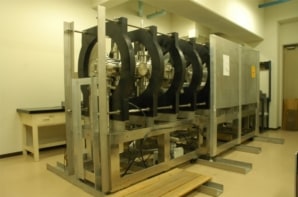Sick of Scrabble? Cheesed off with crosswords? Then why not try Blank - a new board game invented by two nuclear physicists in the UK? Andy Briggs and Angela Ramsay from Oxfordshire decided to invent Blank because they were so dissatisfied with existing board games. Although the new game has nothing to do with physics, the inventors needed a sound knowledge of the subject to build the product itself.

In the game, players are presented with two rows of three letters, where each letter is spaced by a single blank. The aim is to make as many words as possible using the sequence of letters and blanks in a given length of time. So, for example, the letters I-blank-C-blank-R could be used to make INCUR, PINCERS or MINCE, while the letters O-blank-S-blank-L could be used to make CAROUSEL, DORSAL or TONSILITIS. Longer words score more points.
Although Briggs and Ramsay say that Blank is simple, a lot of physics knowledge was needed to build the game. The letters are presented to players on a special figure-of-eight track made of plastic, which allows them to be shuffled before each player’s turn and so provide millions of possible combinations. Each letter appears on a chip – made of plastic rod cut into a disk.
“We had to be able to predict how the different materials would ‘bind’ to each other during operation because the mechanical forces between them are very complicated and have to be modelled”, says Briggs. “The game had to have a low enough total friction to be operated effortlessly by hand. We also had to decide how to get mathematical variation into the game without having to constantly bring in new letters from a bag or shuffle the letters.”
Briggs and Ramsay decided to invent Blank because they wanted something that improved on what they felt were unsatisfactory aspects of other word games. “For instance Scrabble is good, but it is boring if there are more than two of you playing.” Briggs told PhysicsWeb. “There is no strategy because you cannot influence the other players. We also wanted to be able to use all the words in the dictionary and not be limited to words of merely seven or eight letters.”
The duo hope that the game will appeal to physicists and non-physicists alike. “We designed the game to appeal to ourselves, so it should attract people from a similar background,” says Briggs. “Words of any length can be played so you would be free to use all the interesting and elegant words you use in your own field of science.”



